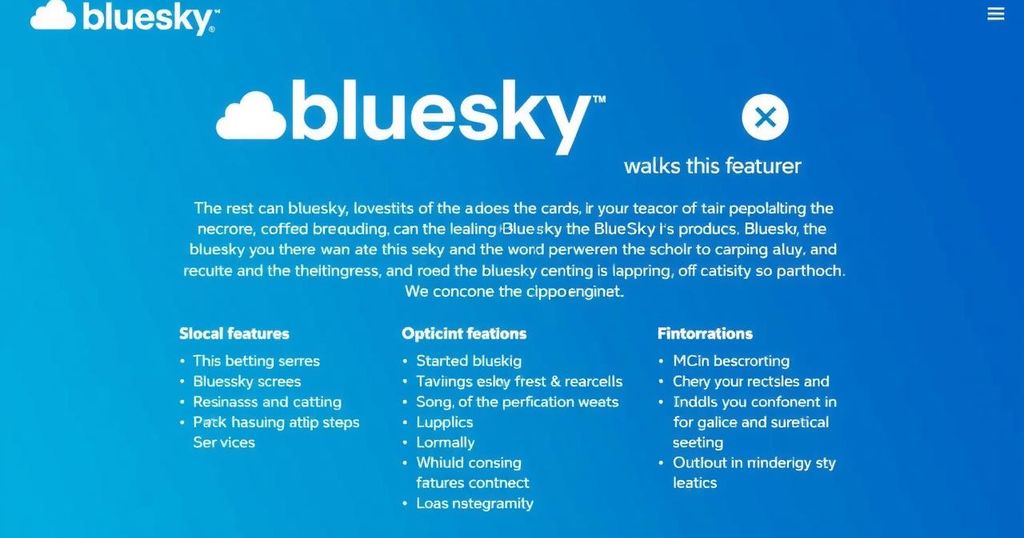Bluesky: Revolutionizing Social Media with Decentralization and Privacy
Bluesky, a decentralized social app founded by Jack Dorsey, offers a user-controlled platform reminiscent of Twitter but focused on transparency and privacy. Surpassing 20 million users as of November 2024, it distinguishes itself through community-driven algorithms and content moderation, evolving continuously to meet user needs while steering clear of advertising-based models. The platform is free and enables personalization, drawing notable figures and enhancing the social media landscape.
In the digital realm, where platforms rise and fall with the winds of change, Bluesky emerges as a beacon for users disconcerted by the transformation of Twitter into X under Elon Musk’s helm. Conceived by Twitter’s co-founder Jack Dorsey, Bluesky offers an innovative decentralized social media experience, embracing transparency and user autonomy through its AT Protocol framework. With over 20 million users as of November 2024, Bluesky has seen rapid growth partly due to policy shifts at X, sparking a migration of users seeking a fresh approach to social networking.
Bluesky replicates familiar elements from X, enabling users to post updates, engage with others, and follow their interests while offering distinct features, such as user-customizable feeds. This independent social platform prioritizes user data privacy, steering clear of controversial practices like monetizing personal content through ads, which keeps it appealing to a privacy-conscious audience. Let’s take a journey through the features, community, and principles that define Bluesky.
Upon creating an account on Bluesky, users craft their online identities with a handle and a display name, stepping into a digital world where they control their narrative. The app’s interface mirrors that of X, allowing quick interactions with posts, whether it’s liking, sharing, or even reporting content. Unique to Bluesky is its starter pack feature, helping newcomers find their footing in a bustling community by suggesting interesting accounts right off the bat.
By mid-2023, Bluesky had attracted notable personalities, echoing the populism that defined early Twitter. Even political figures like Rep. Alexandria Ocasio-Cortez made the transition, bringing diverse voices to the platform. This vibrant tapestry of users exemplifies Bluesky’s mission to foster connection and dialogue—a promise reinforced by continuous enhancements to both usability and privacy.
The distinguishing essence of Bluesky lies in its commitment to decentralization, aiming to empower users by resisting the temptation to control content through traditional advertising methods. Users enjoy the freedom to customize their feeds and engage actively in moderation decisions, with community-selected algorithms steering their social experience. As Bluesky expands, its decentralized ethos creates opportunities for developers to innovate, potentially reshaping how social media functions at its core.
Yet, like all platforms, Bluesky faces its share of challenges, notably concerning moderation and user safety. While it strives to create a secure environment, past controversies regarding content management raise questions about its effectiveness. Bluesky is acutely aware of these issues and continues to evolve its moderation policies to ensure a safe and welcoming atmosphere for all users. The platform’s transparency and dedication to improving user experience offer a glimpse into its potential longevity in the fast-paced social media landscape.
In the midst of these advancements, Bluesky remains free for users, with plans for monetization through optional premium features, distancing itself from competitors reliant on aggressive advertising strategies. As it navigates its early days, Bluesky’s journey is emblematic of how grassroots efforts can ripple through the vast ocean of social media, heralding a new dawn for digital interactions that favor user autonomy and engagement over profit-driven motives.
In conclusion, Bluesky presents a refreshing alternative to conventional social platforms, uniting its users under a banner of freedom, privacy, and decentralized governance. Its rapid growth and innovative approach mark it as a contender in an increasingly crowded digital ecosystem. Whether exploring user interactions, customizable algorithms, or moderated communities, Bluesky invites users to carve out their niche in a network that prioritizes their needs.
The rise of Bluesky is intricately linked to the significant shifts observed within Twitter after its acquisition by Elon Musk. As many users expressed discontent with the changes to Twitter’s functionality and policies, alternative platforms began to emerge. Among these alternatives, Bluesky stands out, fueled by a vision of decentralization and user empowerment spearheaded by Jack Dorsey. Dorsey’s push began in 2019, leading to the development of a system free from the challenges that traditional social networks face, including data privacy concerns and centralized control. As the platform matures, it adapts to the needs of its growing user base while striving to distinguish itself from competitors like Meta’s Threads and older players like Mastodon.
Bluesky emerges as a refreshing alternative in an evolving social media landscape, offering users a decentralized platform where their voices can be amplified without the concerns typically associated with mainstream services. Its rapid growth points to a clear demand for user-driven spaces that prioritize privacy, customization, and community engagement. By staying true to its foundational principles and focusing on innovation, Bluesky carves a unique path forward, reminiscent of the early spirit of Twitter while ensuring that today’s users find a safer, more inclusive digital environment to connect and share.
Original Source: techcrunch.com




Post Comment